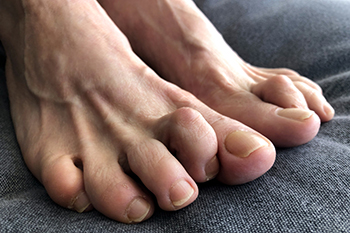
A hammertoe is caused by the misalignment in one of the toe joints which results in the toe developing a Z-shaped deformity. It can develop from rheumatoid arthritis, neurologic foot disorders, or other causes. Typically, the second toe is affected, and this happens because of an elongated second metatarsal and pressure from a bunion on the big toe. Corns can progress on the hammertoe deformity and can be an additional source of pain. When one has a hammertoe, it is important to wear shoes with a wider toe box so the toes have enough room to move freely, as well as to accommodate the foot deformity. Toe pads and orthotics might also help those with hammertoes. If these conservative measures are not helpful, speak to your podiatrist and see if surgery is an option. If you suffer with a hammertoe, it is suggested that you visit a podiatrist for an examination and treatment.
Hammertoe
Hammertoes can be a painful condition to live with. For more information, contact Brandon M. Zuklie, DPM from New Jersey. Our doctor will answer any of your foot- and ankle-related questions.
Hammertoe is a foot deformity that affects the joints of the second, third, fourth, or fifth toes of your feet. It is a painful foot condition in which these toes curl and arch up, which can often lead to pain when wearing footwear.
Symptoms
- Pain in the affected toes
- Development of corns or calluses due to friction
- Inflammation
- Redness
- Contracture of the toes
Causes
Genetics – People who are genetically predisposed to hammertoe are often more susceptible
Arthritis – Because arthritis affects the joints in your toes, further deformities stemming from arthritis can occur
Trauma – Direct trauma to the toes could potentially lead to hammertoe
Ill-fitting shoes – Undue pressure on the front of the toes from ill-fitting shoes can potentially lead to the development of hammertoe
Treatment
Orthotics – Custom made inserts can be used to help relieve pressure placed on the toes and therefore relieve some of the pain associated with it
Medications – Oral medications such as anti-inflammatories or NSAIDs could be used to treat the pain and inflammation hammertoes causes. Injections of corticosteroids are also sometimes used
Surgery – In more severe cases where the hammertoes have become more rigid, foot surgery is a potential option
If you have any questions please contact our offices located in Piscataway, Jamesburg, and Branchburg, NJ . We offer the newest diagnostic and treatment technologies for all your foot and ankle needs.
